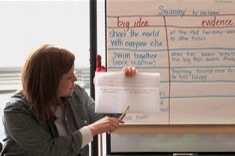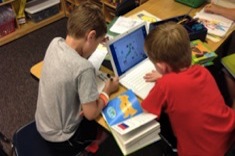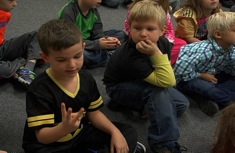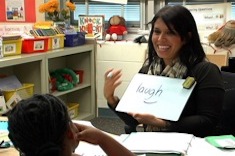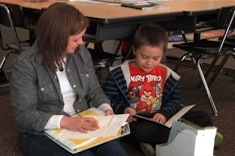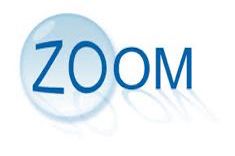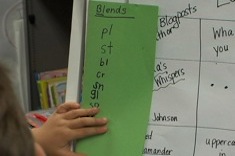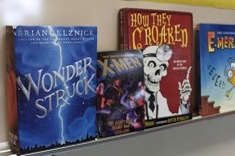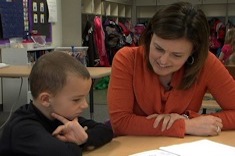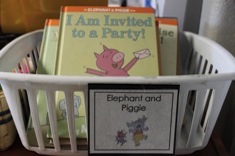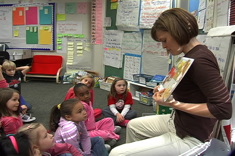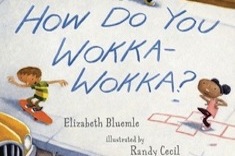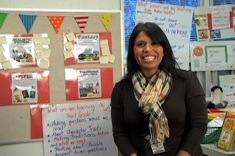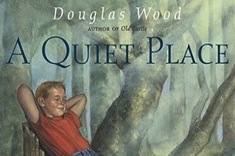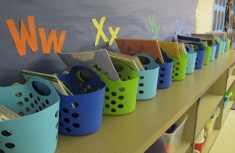1st
Latest Content
Big Idea: First-Grade Lesson
Bitsy Parks introduces her first graders to the concept of theme.
Supporting Readers with Nonfiction Text
Cathy Mere finds that criteria for “just-rightness” varies with genre.
Using Picture Books to Foster Resilience
Gigi McAllister uses picture books to strengthen her fourth-grade classroom community.
First-Grade Math Lesson: Concept Practice and Conclusion
Danielle French's first graders continue to test out new math concepts and language in the conclusion of this lesson series.
First-Grade Math Lesson: Practice and Discussion
Students practice creating equations and using new vocabulary in the second installment of a math lesson from Danielle French’s first-grade classroom.
Teaching Search Skill Basics to Students
Bill Bass has advice for teaching web-based search skills to students.
The Power of Written Blind Word Sorts
Max Brand uses written blind word sorts to build student word learning skills.
Small-Group Writing: Steps for Success
Cathy Mere provides grouping guidelines for primary teachers.
English Language Learners First-Grade Guided Group
Stella Villalba leads a guided reading group of first-grade English language learners, beginning with building vocabulary.
Wyatt’s Running Record
Bitsy Parks completes a running record with first grader Wyatt as part of our running record series.
Picture Books or Beginning Readers?
Many beloved characters from picture books are showing up in beginning readers, and in the process can lose a lot of their appeal. Shari Frost provides teachers with criteria for choosing between picture books or beginning readers.
Questions and Picture Books
Katie DiCesare suggests some mentor texts for fostering curiosity in young readers.
Running Record: Kaenon
Bitsy Parks completes a running record with first grader Kaenon.
Jillian’s Running Record
Bitsy Parks completes a running record with first grader Jillian. This is part of our new running records series.
Running Records: Rationale and Procedure
Bitsy Parks explains her procedures for completing running records in her first-grade classroom. This is the first installment in a video series on running records.
Conferring About Characters in First Grade
Katie DiCesare confers with Vidhi about the main character in her independent reading book.
Whole Class Partner Share Session in First Grade
Katie DiCesare leads her first graders in a reading share session during a character traits unit.
Word Work Basics
Max Brand explains the basics of word work, including a list of reflective questions teachers can ask themselves and students.
Student-Generated Blends Chart in First Grade
Katie DiCesare’s first graders add to a blends chart during reading transition time.
Can Books Harm Children? Support and Censorship
Shari Frost asks a provocative question: Can books harm children? She explores practical ways for teachers to walk the fine line between support and censorship in matching books to students.
First-Grade Humor: Conferring with Jude
Katie DiCesare confers with first grader Jude. He is inspired to use humor in his writing by Captain Underpants.
Reader Response: Keeping It Real
Cathy Mere finds many authentic ways for her first graders to share reading insights.
Books for Studying Illustration with First Graders
Katie DiCesare has suggestions for books to support an illustration unit early in the year.
Understanding Study: Noticing Pictures
Katie DiCesare’s favorite beginning unit with first graders focuses on illustration.
Books for Brain Breaks
Mandy Robek compiles a list of her favorite books for brain breaks with young learners.
A Classroom for Elementary English Language Learners
Stella Villalba gives a tour of her classroom library and publishing corner designed to support the grades 1-5 English language learners she works with daily.
A Strong Foundation: Books and Media for Launching Literacy Workshops
Help students transition back to school with minilessons that give children a strong sense of the purpose of literacy workshops.
Effective Organization
Ruth Ayres has tips for organizing desks, tables, chairs, and materials to support literacy learning.
Launching a Sort
Launching a sort with primary students early in the year begins not with words, but with leaves for Max Brand.
Launching Reading Workshop: Mentor Texts
Mandy Robek shares her favorite texts to use early in the year with young students to introduce them to everything from places to read to how to handle books.
Browse Content By
Type
Category
- Assessment Tools
- Big Fresh Archives
- Booklists
- Choice Numeracy
- Classroom Design
- Common Core
- Community Building
- Conferring
- Content Literacy
- Digital Literacy
- English Language Learners
- Equity
- Family Relations
- Free Samples
- Guiding Groups
- Leadership
- Literacy Coaches
- Mentor Texts
- Minilessons
- New Teacher Mentors
- Podcasts
- Poetry
- Quote Collections
- Reading Strategies
- Self Care
- Struggling and Striving Learners
- Talking and Listening
- Teacher Study Groups
- Teaching Reading
- Teaching Writing
- Word Study and Vocabulary
Author
- Melissa Quimby
- Nawal Qarooni
- Gwen Blumberg
- Julie Cox
- The Lead Learners
- Hannah Tills
- Josie Stewart
- Ruth Metcalfe
- Mallory Messenger
- Becca Burk
- Jodie Bailey
- Vivian Chen
- Mary Brower
- Tiffany Abbott Fuller
- Stephanie Affinito
- Ruth Ayres
- Leigh Anne Eck
- Heather Fisher
- Shari Frost
- Julie Johnson
- Suzy Kaback
- Gigi McAllister
- Shirl McPhillips
- Melanie Meehan
- Cathy Mere
- Debbie Miller
- Tara Barnett and Kate Mills
- Tammy Mulligan
- Dana Murphy
- Bitsy Parks
- David Pittman
- Brenda Power
- Heather Rader
- Matt Renwick
- Mandy Robek
- Christy Rush-Levine
- Gretchen Schroeder
- Jen Schwanke
- Brian Sepe
- Katherine Sokolowski
- Stella Villalba
- Jennifer Vincent
Grade Level
Choice Literacy Membership
Articles
Get full access to all Choice Literacy article content
Videos
Get full access to all Choice Literacy video content
Courses
Access Choice Literacy course curriculum and training

